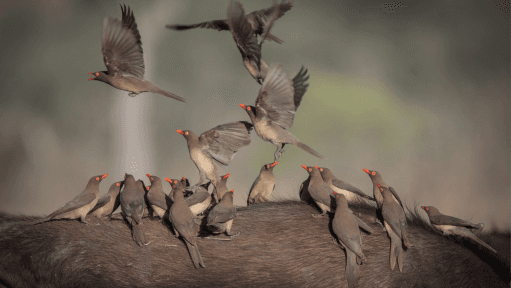
Authorities in Abu Dhabi Issue Urgent Notice to Safeguard ‘Beautiful’ Wild Birds
Embracing Conservation: Ensuring the Future of Abu Dhabi's Wild Birds and Traditional Hunting Heritage
With summer in full swing, Abu Dhabi's islands offer a refuge for birds during the hot months. Some islands also serve as crucial breeding grounds for migratory terns during this season.
Collecting the eggs of wild birds is illegal. Under Federal Law No. (24) of 1999, it is prohibited to hunt, capture, or harm wild birds and their nests. Violations of this law can result in imprisonment and fines ranging from Dh2,000 to Dh20,000.
In addition, authorities have introduced a new law regulating wildlife hunting in Abu Dhabi to protect and preserve national heritage. Last Monday, the Executive Council of the Emirate of Abu Dhabi issued a local decree amending the executive regulations issued by Resolution No. (69) of 2015 for Local Law No. (22) of 2005 regarding the regulation of hunting in Abu Dhabi.
This law, currently implemented by the Environment Agency – Abu Dhabi (EAD), supports the hunting sector in its efforts to preserve the heritage of traditional hunting in Abu Dhabi. It ensures that this ancient Arab tradition and its values are passed on to current and future generations while respecting legal and environmental frameworks.
The updates to the law also emphasise enhancing the economic value of natural resources by diversifying and enhancing investment opportunities in the environment sector. This ensures that traditions such as falconry comply with international environmental sustainability standards.
The decision exempts all hunters and operators from the "Species Conservation Fee" and cancels it from the executive regulations issued by Executive Council Resolution No. (69) of 2015.
Additionally, the decision stipulates that EAD shall issue guidelines and conditions for hunting using traditional methods outside the designated hunting areas determined by EAD. This involves prohibiting hunting within the borders of protected areas, rangelands, or near restricted areas as specified in Article (4) of Local Law No. (22) of 2005.
The traditional hunting permit issued by EAD will include terms and conditions for hunting, such as the details of the licence holder, the seasons and areas of hunting, and the species licensed for hunting.
The permit will also emphasise additional legal provisions regarding species conservation and promote sustainable hunting.According to the decision, EAD has outlined the species allowed to be hunted by falconers, which includes only Houbara birds.
Hunting is permitted using falcons licensed and registered with the Ministry of Climate Change and Environment, and proof of registration must be submitted if requested.
Traditional hunting is restricted to open areas while avoiding prohibited places such as nature reserves, forests and residential, military and petroleum production areas by no less than two kilometers.
EAD stressed the need for the licensee to abide by the specified hunting period, with permits issued for one season only. EAD will also start licensing wild hunting for this season until 28th February 2022, under the terms and conditions set by EAD as the competent authority.
It is prohibited to hunt any wild animal and cause its disturbance. It is also forbidden to drive vehicles over and damage vegetation. Furthermore, it is prohibited to transfer a hunting permit to another person. The permit must be carried while hunting and presented upon request.
To obtain a wild hunting permit, the applicant must be a citizen of the United Arab Emirates and be at least 18 years old. The application for a wild hunting permit can be submitted through the EAD email at customerhappiness@ead.gov.ae.
Law No. (22) of 2005 on hunting in Abu Dhabi lays down a legal framework for hunting activities to ensure they are within environmental controls and standards, consistent with the supreme goals and efforts to preserve and conserve wild animal species in a manner that does not conflict with the sustainability of their numbers in their natural habitats.
The law contributes to protecting the heritage of falconry, protecting wild animals, preserving hunting areas, and optimising wildlife resources according to an integrated vision that meets environmental sustainability standards.
The law aligns with other local and federal environmental laws to ensure adequate biodiversity protection while maintaining local culture and traditions that depend directly or indirectly on natural resources.
The Environment Agency – Abu Dhabi is currently creating a model for hunting in Abu Dhabi benchmarked against international standards and best practices from across the world, including Europe, Africa, the United States, Canada and countries in the Arab region.
The UAE has updated its wildlife hunting laws to promote traditional hunting while ensuring sustainable development and species protection. The Environment Agency is responsible for enforcing these regulations and will issue guidelines for traditional hunting outside designated areas, prohibiting hunting in protected zones.
The amendments to Abu Dhabi Executive Council Decision No. 69/2015, as per Decision No. 5/2021, aim to preserve traditional hunting. Hunting permits will specify terms, including licence holder information, hunting seasons, areas and species allowed (currently only Houbara birds). The Species Conservation Fee is waived, and hunting with licensed and registered falcons is permitted.
Traditional hunting is restricted to open areas, and permits are valid for one season, expiring on 28th February 2022. The law prohibits harming wild animals, driving vehicles over vegetation, and transferring permits. Hunters must carry their permits and be UAE citizens over 18 years old.
For any enquiries or information, contact ask@tlr.ae or call us on +971 52 644 3004. Follow The Law Reporters on WhatsApp Channels.